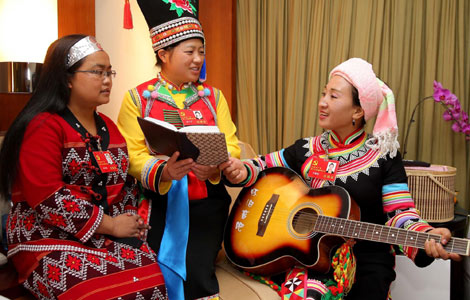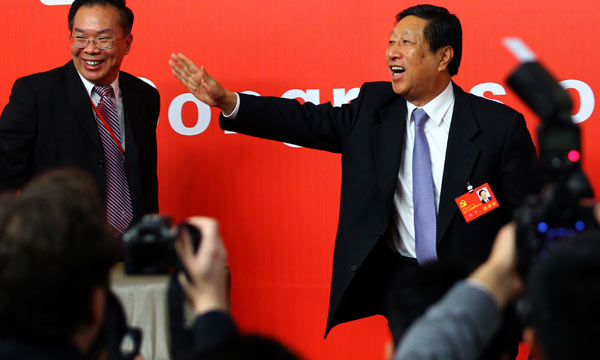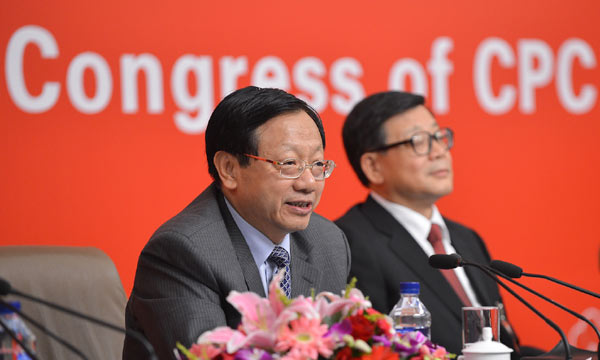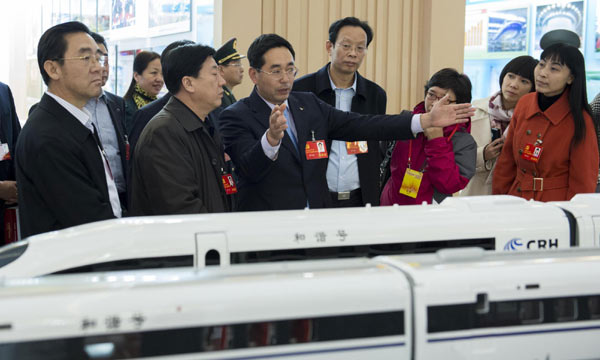Micro-blogging at CPC Congress:Party and law
(Xinhua)
Updated: 2012-11-08 22:24
BEIJING - After Hu Jintao delivered a political report at the opening of the 18th National Congress of the Communist Party of China (CPC) on Thursday morning, one small line seemed to have made ripples on the microblog sphere.
It read, "As the Constitution and laws are adopted by the Party and the people under its leadership, the Party must act within the scope prescribed by the Constitution and laws. No organization or individual has the privilege of overstepping the Constitution and laws, and no one in a position of power is allowed in any way to take one's own words as the law, place one's own authority above the law or abuse the law."
Lyuqiu Luwei, a prominent journalist of Phoenix TV, posted it on her microblog, which was forwarded more than 2,100 times and drew over 1,400 comments within hours.
Lyuqiu has over 2.11 million followers on Weibo.com, China's most popular twitter-like service, and her preference is shared by many on Sina Weibo which has more than 300 million users.
While Hu was delivering the report, several major news organizations posted highlights of it on their official pages on Sina Weibo. Among the highlights, the line Lyuqiu favored was commented and forwarded the most.
On the Sina Weibo page of the People's Daily, the no-one-above-law highlight was re-posted nearly 2,000 times, while none of the other highlights were forwarded more than 1,000 times.
Many embraced the line for the principle behind it, applauding that it showed the resolution of the CPC to advance law-based governance in a society.
"Really good point," commented a Sina Weibo user who goes by the name of "Xinshanzhidian". Another user called "Monte Cristo" offered his interpretation, "One set of laws and standards, extending equal treatment to all."
The meaning of the line, however, was confusing to some, who were wondering whether it is possible to have a party abide by the law that was made under its leadership.
Sina Weibo user, "Nieyunieyu" was obviously quite upset about such questioning, deriding people like him as having a declining ability to read Chinese.
He wrote, "Let me tell you the meaning. Before the Party revises current laws, it must act within them. To the clauses in the Constitution and laws, which do not conform to the new situation, the Party can amend them following due procedures."
Han Dayuan, a renowned constitutional law professor and dean of the Law School of Renmin University, told Xinhua that there is no contradiction in the line.
According to him, the governing status of the CPC is enshrined in the Chinese Constitution and, as the governing party, the CPC certainly excises leadership over the enactment and revision of the Constitution, but its leadership is not direct.
"The Party does not enact or amend the Constitution directly itself. It proposes amendments to the National People's Congress, China's top legislature, which has the exclusive power to amend the Constitution. The Party has to follow due procedures in doing so," he said, adding the legislature is elected by the people.
Related Stories
CPC advocates building 'beautiful' China 2012-11-08 21:15
KMT congratulates on CPC congress 2012-11-08 19:27
CPC congress creates new prospects:Moroccan lawmaker 2012-11-08 19:21
CPC National Congress gets world attention 2012-11-08 16:12
China adds per capita income into growth target 2012-11-08 16:13
Party congress delegate hails power of cyberspace 2012-11-08 15:51
Ecological progress in China's development plan 2012-11-08 14:11
Video







